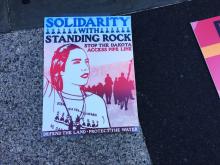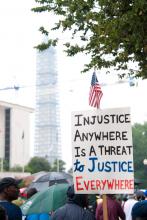Justice

All great resistance communities practice a two-pronged approach. Mohandas Gandhi described this as an “obstructive program” alongside long-term “constructive engagement.” Both are needed for the wheel of resistance to turn.

On Jan. 21, I’ll join thousands in D.C. for the Women’s March on Washington. My first stop will be at a local congregation, one of several hosting a prayer service and warming station for marchers. I’m an anti-racist, feminist, Christian, and for me, faith will be part of the day.
I’ve been disappointed with Christian silence, and even active resistance, to social justice imperatives, but my commitments to justice stem from my faith, and that’s why I march.

On election night, I hunkered down in my living room, eyes glued to the television, waiting for the announcement. When talking heads announced that Hillary Clinton conceded the election to Donald Trump, my body shook — literally. I could not control it. I had never experienced anything like it. A cry rose from the pit of my stomach and quickly turned into a primal scream.

Some of my friends have been talking about giving up the “evangelical” label, because of what it has come to be associated with, in this year’s political campaign. I’m not ready to make that move. I spent a good part of the 1960s trying hard not to be an evangelical, but without success.
When I marched for civil rights during my graduate school years, I helped to organize “ban the bomb” marches and protested the Vietnam War. I was clearly out of step with much of the evangelicalism of the day.

If it is “leftist propaganda” to talk about the poor, the widow, the orphan, and the immigrant, to talk about justice and love for God and neighbor, to talk about humility and grace — in short, to talk about the gospel of Jesus Christ, then let us do it all the louder. Otherwise, we trade the truth for power. We trade our witness for the respect of the empire.

Dec. 4 was a beautiful reminder, in the long struggle for justice, that, no matter how long we wait, God hears our cry. And love and justice will win.
A few weeks ago, Chief Arvol Looking Horse issued an invitation to clergy and faith leaders to stand in solidarity with the people of Standing Rock. He said he was hoping maybe 100 would respond. But I joined thousands, in a procession of faith leaders, to gather around the sacred fire at the Oceti Sakowin Camp at Standing Rock.
I knew something special was happening here.

As members of the left, we find ourselves wanting meaning, now, no less than did those who voted to Make America Great Again. We want a theodicy. We want answers. We want, in a sense, a religious explanation for how to proceed next.
It would be intellectually satisfying to come up with new narratives. It would also be lazy.
As Christians, what we are called to do is sacrifice that. We go on living. That’s it. We donate, if we choose to; we participate, when we can, in acts of goodness and solidarity and defiance; we rage against racism when we see it; when men grope women on subway platforms we follow the women to comfort them, as happened to me earlier this week. We do dull, good things, and we vote. We love, but do not soothe ourselves with the softness of that love. We deconstruct our own narratives, especially when they make us feel good.
We cry out in the wilderness. But we do not expect answers — not yet, and maybe not ever. If we are called to anything, now, it is do the work of living without them.

Trump has painted a picture of America where walls loom, refugees are banished without a merciful glance, families are torn apart, people of color are killed more frequently and with even less consequence, and the suffering are left to suffer all alone. I find myself praying for a presidency that is only bad rather than catastrophic. And I find myself resolved with a new certainty to never let the vision Trump has painted come true.

Rebecca Solnit, Maria Popova, Ta-Nehisi Coates, and Walter Brueggemann represent cultural figures who model “broad perspectives with specific possibilities, ones that invite or demand that we act.” Hope is necessary for action. Yet a transformed future demands contemplation, as well.
The collective turmoil people experience during political uncertainty, systemic oppression, and natural disasters have potential to unlock deep places of human connection. When collectively we are at our worst, let us look back at what we’ve overcome — and remember our deep connection to one another into the future. Contemplative practice is the figurative room in which we experience the freedom to remember and courage to respond. It is what it means to have hope as a spiritual practice.

Harper’s account of the Gospel in her new book is shalom-based. Drawing deeply from a theme that runs through the Bible but is especially strong in the Hebrew prophets, Harper tells a story of a God who acts in Jesus Christ to bring shalom, or holistic peace and justice, in every part of creation.

Why We Can’t Wait is the familiar title of Martin Luther King Jr.’s book from 1964. The volume includes his famous “Letter from Birmingham Jail” (written April 16, 1963) and makes an argument to recognize 1963 as the beginning of “the Negro Revolution” while extolling the effectiveness of nonviolent resistance.
King’s “Letter” issues a call for urgency. He wrote it as a response to eight local white clergymen who had criticized his activities in Birmingham and appealed for a more patient and restrained approach to lobbying for civil rights. The “Letter” expresses King’s deep disappointment with “the white moderate,” who “paternalistically believes he can set the timetable for another man’s freedom.”

When my oldest daughter, Hannah, was in elementary school she asked me to explain the difference between conservative and liberal. I replied, “It’s too complicated.” She said, “Try me.” So I told her my best description was a metaphor, that of life as a high-wire act. Liberals are worried that without a net below the high-wire act of life, the performer may die or suffer when they fall. Conservatives are worried that if a net is built below, the performer may not be concerned enough about falling and use the net as a hammock. She paused for a moment and responded, “Why not build a trampoline below, so if they fall it will send them right back up?” Indeed.

Would we press harder if we thought of our words not as another voice in the fracas but as God’s mandate to justice? The word of the Lord hits Amos as one who is otherwise apt to mind his own business. Those who are compelled to speak should never stop speaking.

The solution to our awful prison problem is contained in the story of Gov. Edgar, Ratliff, and Celestial Ministries: Make a preferential option for those who are most impoverished in our midst. We might fund these efforts by taking money away from the corporations promoting criminal attacks on innocent people in other lands.

I wish that the testimony of my friends who literally beat guns into garden tools could be part of the courtroom proceeding. They urge us to make guns and other weapons unnecessary, using raw tools of compassion and service to heal the conflicts in which weapons are used. I wish my young Afghan friends here in Kabul, who live under constant surveillance of Unmanned Aerial Systems, could testify about their desire to refine tools of peace making and constructive service.

My love for comedy and the communal spaces that black barber and beauty shops offer was the reason why I had to see Barber Shop: The Next Cut with some of my friends last Saturday night in New York City. As promised, the controversial jokes abounded, and we laughed, but my friends and I were also challenged by seeing the characters use what was in their hands (Exodus 4:2) — their hair care skills and the space of a small black-owned business — to respond to gang violence in Chicago.

Developing real estate is not new to justice-minded groups — religious organizations from New York City to East Africa are weighing the symbolic meaning invested in their land against practical survival plans for the mission. What makes Union’s plans particularly upsetting to campus protesters is its location. When Union announced it was in talks with a developer to build condominiums on campus, the move was met with outcry from some students, alumni, and faculty. But President Jones said this move is nothing new for the school — only now, perhaps, it’s more public.

There are women in my life I choose to breathe with. With these women, I turn our breath into sounds, sounds into words, and raise them together in solidarity across the currents of justice. Together, we fight for the environment, we fight for rights, for black lives, for women's rights — and constantly strive for peace.

READERS OFTEN ASK US: How can I incorporate a hunger for justice into my child’s spiritual formation? How do we help the youngest members of the church understand the gospel’s call to love God and to love our neighbors as ourselves? Sojourners asked five Christian parents engaged in various forms of justice work to share their best tips for helping children put their faith into action. Here’s what they said. - The Editors
1. Look for Teachable Moments
by Kate Ott
MANY PARENTS FEEL unprepared to talk about sex or faith with their children. I was one of those parents until I realized age-appropriate sexuality information could empower my children and keep them safe. I also realized that teaching my kids about sexuality meant more than talking about “sex.” After all, if I didn’t talk to my kids about how Christian values of love, justice, and mutuality guide the care of our bodies and our relationship choices, who would?
So rather than planning for a single “big talk” or waiting until I know all the answers, I practice parenting through teachable moments. For example, in our house we talk about how clothing choices and hygiene reflect our thankfulness for our bodies as part of God’s good creation (including remembering to brush teeth!). As a parent, when I take a picture of my kids, I ask them for permission before posting it on social media; this encourages thinking-before-posting and consent as an active yes. And when we’re watching TV or listening to a song in the car about attraction or a relationship, I ask questions like: How would you feel in that situation? Do you think that person values their body? Does that seem like a mutual decision/relationship? Is that kind of love balancing God, neighbor, and self? In the short conversation, I always say something like, “Being in a relationship takes a lot of work and requires communication, honesty, commitment, and mutuality.” This models how to use one’s values to assess relationship choices.

But if the truth be told, black Americans do not have a monopoly on social justice exhaustion, or “justice fatigue,” as Dr. Teresa Fry Brown describes it. The fact is many people of goodwill that make up the broad rainbow coalition of those who fight for justice and inequality find themselves increasingly tired and overwhelmed these days. With all of the intractable issues in our society that seemingly won’t get right or can’t get right, many justice workers and seekers of all kinds are finding themselves in need of a refreshing well of renewal.
This raises the important questions, who cares for the care-givers? Who shows love to those who seek the expansion of love in public policy and democracy?